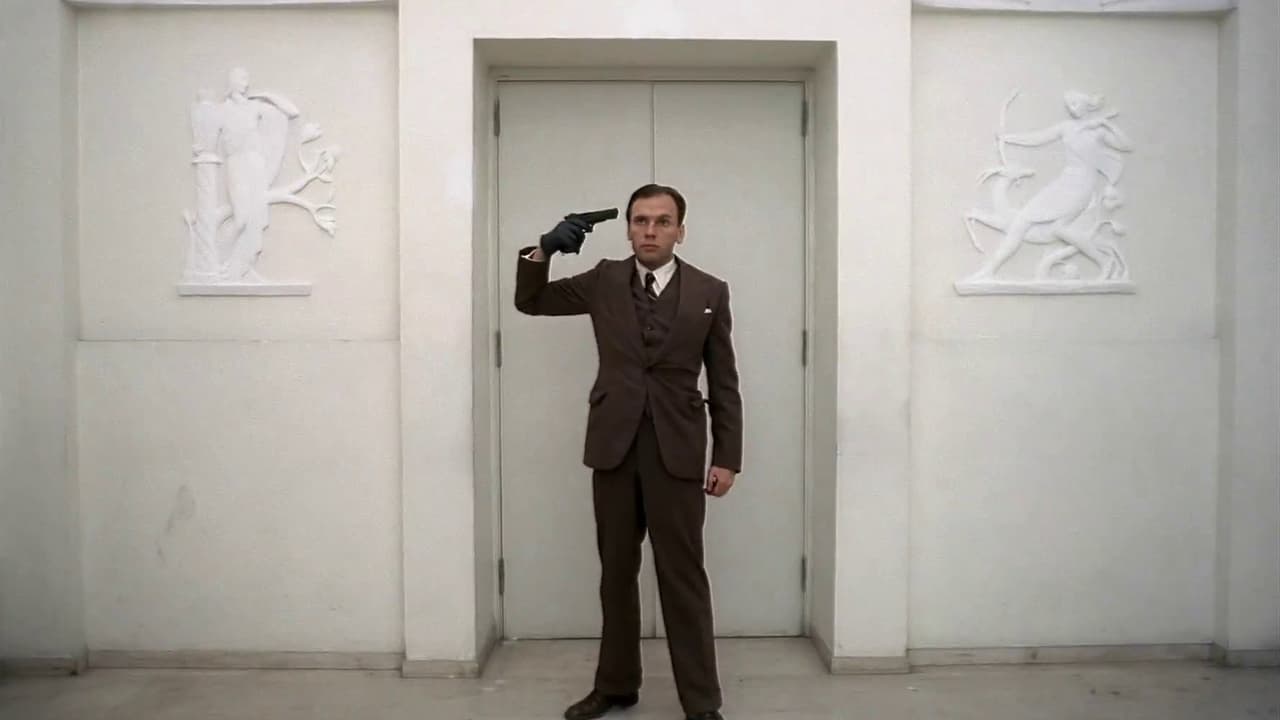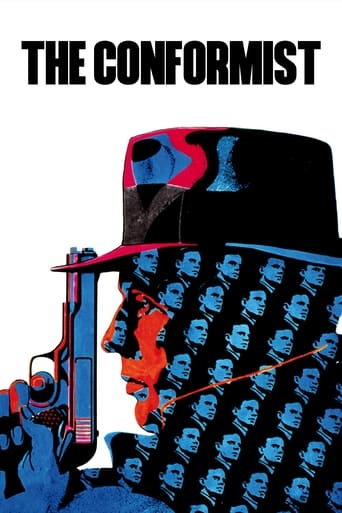

This is an amazing, beautifully made cinema. The movie begins when the protagonist is in a hurry and he is traveling somewhere. As he is in the car, his memories comes. This gives the story of the film. This non-linear pattern of story telling makes the movie more interesting.Rather than political tension prevailing, I was more attracted and haunted by the personal attachments and drama. That was an amazing plot.This movie, according to me gives a lot of lessons on cinema, cinematography and direction. The framing, camera movements, shapes, colors, actors placement, blocking, mise en scène etc are all superb. I enjoyed the movie very well.A must watch. highly recommended. #KiduMovie
... View MoreThe career performance from JeanLouis Tringtingant as the 'conformist' of the Italian Gestapo defines this political drama along with the mastery work of mastermind Bernardo Bertolucci.It is simply a classic film in genre, very appealing to those who know their history of fascist Italy. Tringtingant portrays the confined movements and confidential mannerisms of the gestapo officer in such a fashion that it is unquestionably spot on.A powerful film, the Conformist is one that has very deep back stories, tying loose ends in the film and giving it another dimension. The watcher is engaged within the secret lives of many throughout this film.This is without doubt an enthralling political drama which is good study material and is quite realistic in multiple ways.
... View MoreDirector Bernardo Bertolucci was on to something when he directed and wrote Il Conformista/The Conformist in 1970. It's a political thriller of sorts, dealing with the fascist politics of Italy around 1938. More than that, however, it's a psychological examination of one man's mind, Marcello's. The film traces the important events of his life, how sexuality and violence traumatized him, and how it all led to him being desperate to conform to whatever seems popular at any given time. The desire to be normal is something we're all familiar with, but Il Conformista pushes this phenomenon to its most psychologically extreme form.The story begins in 1938 in Paris when Marcello (Jean-Louis Trintignant), sitting on his hotel bed, is called by his employer, a member of the Fascist secret police, telling him the plan's about to go enter the final stage: the murder of a college professor who's fled Italy when the fascists took over. To make matters more interesting, the professor is an old acquaintance of Marcello's. He gets in the car with a colleague and together they chase down the professor. The film then flashes back to other crucial parts of Marcello's life to show how he became the man he is today. Every once in a while, the film goes back to the present, with Marcello sitting in the backseat while his colleague chases after the professor. Though to say too much would be spoilerish, flashbacks include an early one when where Marcello is bullied as a child and saved by chauffeur Lino. He takes him to a mansion where he shows him a gun and then tries to seduce him. Marcello seems to give in to his advances, but then takes the gun and kills Lino in a hail of bullets. Other flashbacks show his attempts to join the fascist secret police and his attempts to be normal. The only reason he wants to marry Giulia is because he thinks she's as plain as can be, a typical normal wife that all of society can accept. The entire film thus leads up to the point where Marcello and his colleague give chase to the professor.I've always considered Il Conformista to be more of an incredibly subtle horror film than a drama or a thriller. Obviously, the film isn't a typical horror film, but it is horrifying in terms of its psychological portrayal of Marcello. This is particularly apparent in the film's climax in regard to the professor which even now is hard to stomach. The number of ways in which that scene is horrifying is something no typical horror film comes close to achieving, because it's not about physical violence so much as it is about the emotional violence inflicted on a fellow human being. It's hard to explain. You have to see it to believe it. There's something quite threatening ingrained in every single scene which is ironic, because the film looks absolutely stunning. Here's where Bertolucci and legendary cinematographer Vittorio Storaro's achievements come into sharp focus. First of all, they emphasize the Fascist art style during the scenes where Marcello's in the vicinity of Fascist government buildings. The architecture is easily recognizable with its emphasis on the color white and sharp angles. It's very suggestive of old German propaganda films. On the other hand, the film's color scheme is very lush which contrasts with the physical and emotional violence taking place.The way the story is set up is absolutely wonderful and there are little things that tie several events together quite nicely. Consider for instance the notion of the driver, or the chauffeur. Every time we see Marcello inside a vehicle, he's never driving himself, he's always being driven by someone else. In the same sense, he's also driven by others to do their dirty work for them. During the entire chase scene, Marcello occupies the backseat; when he's a little boy, he's chauffeured by Lino to a mansion; he and his fiancée Giulia occupy a train cabin, etc. It's a neat and subtle way of symbolizing how Marcello is not in control of his own life and tends to follow those that lead. Half the story is basically told through the cinematography. Also important is the way in which Bertolucci links the themes of sex with fascism and violence and the desire to be 'normal' and how this is all intertwined in Marcello's mind. Marcello doesn't care about joining the fascists beyond that it will help him appear normal in the eyes of others. The themes of sex, violence and fascism are those that director Bob Fosse would utilize in Cabaret two years later. While both are successful in doing this in their own ways, there's a risk in that by equating the politics of their times with sex, you simultaneously ignore the other historical factors at play. Obviously, Bertolucci and Fosse are aware of this and that one film can't encompass the entire rise of Fascism, but it's important to note nonetheless. And it's peculiar indeed that these two films which so closely followed one another look at the subject of fascism through similar lenses. Either way, Il Conformista is classic cinema in the finest sense. The editing keeps the audience on its feet with the constant crosscutting between past and present, constantly promising death is on its way, the cinematography is lush and suggestive, Delerue's score is melancholy and tense, Trintignant is incredibly understated and Bertolucci's direction is wonderful. A political and psychological thriller for the ages.
... View MoreWhat is it, where is it, how will it affect me? In a 1938 politically unstable Europe, a weak-willed Italian man becomes a fascist flunky who goes abroad to arrange the assassination of his old teacher, now a political dissident. Il Conformista is a work of art that's as close to flawless as one can get. It's dapper, sophisticated, sexy, compelling and dearly cosmopolitan, whilst being metaphorical and gripping. And, moreover, for a subject matter than little of the audience will have any personal or sentimental connection with, it's deeply powerful and engrossing. Il Conformista paints the portrait of a bohemian, artistic and edging closer-to rapture Europe yet still highlights through intricate narrative, an in-depth character study of the weak willed, the distressed and the deluded a Europe that is on a political tether. In its parades and its dances, through its screams and its silence, Il Conformista is a masterpiece that connects the now and then, conflicting desires, oozing style and a confused culture in more colour, more grit and more eloquence than the proclaimed greats of yonder years ever managed to. The climactic ending is a highlight with an almost perpetual aftertaste, where the conformist himself (Jean-Louis Trintignant) undertakes the assassination of his former mentor in a misty, dimly lit wood, a setting to quench the thirst of Arthur Conan-Doyle, as the victim's wife, a former lover, screams bitterly. Our conformist relaxes, his hat shadowing his face, his eyes glinting with thoughts of a million facets pouring over them. Il Conformista is littered with endless examples of seductive cinematography, bold and inviting colour schemes, elaborate musical ventures and stylistically superior heights than anything I've ever seen. Nevertheless, at the end of the day, Il Conformista is a thriller, and it certainly is thrilling, to say the least. To an impatient viewer, Il Conformista has whole other arsenal dimension of scenes that focus on deceit, murder, ill-intention and metaphorical dissidence. To a historian, the way that the portrayed era's political climate is capitalised on and exploited for dramatic effect is staggeringly remarkable. And lastly, to an artist, Bertolucci's genius behind the camera and his steady, wise hand in directing the lighting is second to none.
... View More